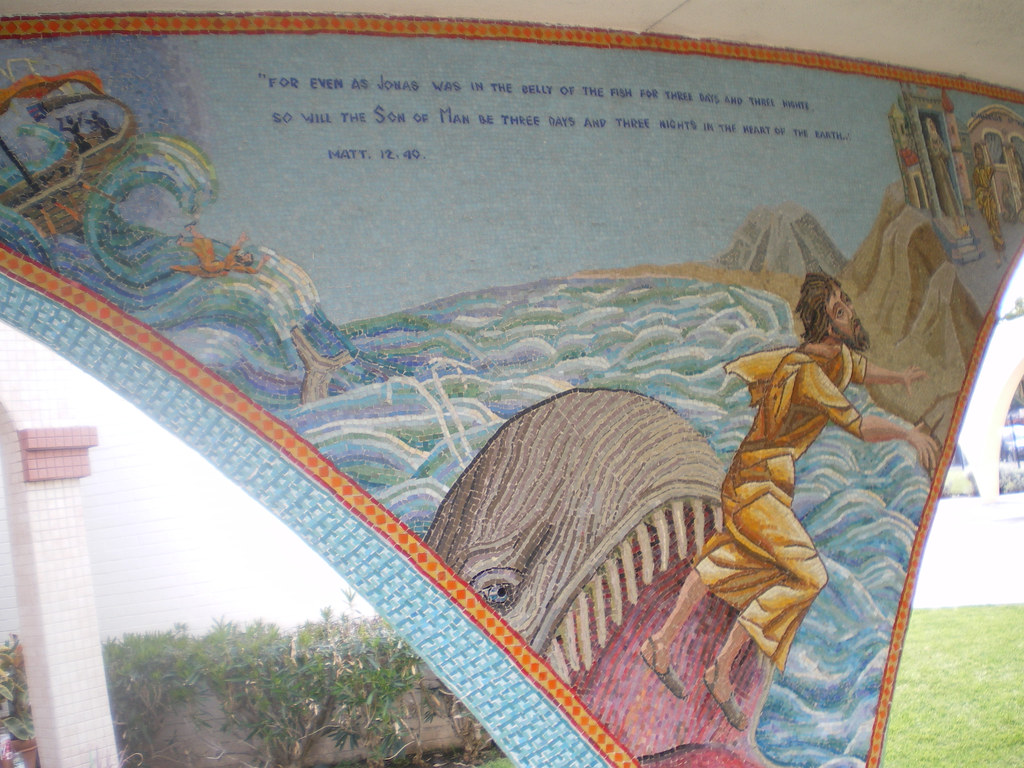Jonah 2: A Hymn from the Belly of the Beast, Echoes of Transformation and Hope
Jonah Chapter 2 plunges us into the inky depths of the giant fish’s belly, where the runaway prophet confronts his mortality and finds refuge in a powerful prayer. This transformative chapter transcends the physical constraints of its setting, offering a timeless hymn of repentance, hope, and God’s boundless grace. Let’s dive into its depths, exploring its connections to themes of salvation, spiritual renewal, and the enduring power of faith in the face of despair.
From Despair to Prayer:
Jonah’s initial defiant silence gives way to a desperate cry for help: “In my distress I called to the Lord, and he answered me; from the belly of Sheol I cried, and you heard my voice” (Jonah 2:2). This poignant shift reflects the transformative power of facing one’s mortality. In the face of death, Jonah turns to God not with excuses or accusations, but with humble repentance and a plea for mercy.
This transition resonates with biblical characters like King David in Psalm 18 and the psalmist in Psalm 130, who also find solace and redemption through prayers uttered in moments of deep despair. It reminds us that God is near even in our darkest depths, and that genuine repentance can pave the way for forgiveness and restoration.
Images of Entrapment and Deliverance:
The chapter utilizes vivid imagery to depict Jonah’s predicament. He describes being wrapped in seaweed, surrounded by the abyss, and sinking to the roots of the mountains (Jonah 2:5-6). These metaphors paint a picture of spiritual and physical entrapment, highlighting the consequences of his disobedience and the hopelessness of his self-imposed exile.
However, amidst the darkness, flashes of hope emerge. Jonah remembers God’s temple, a symbol of divine presence and sanctuary (Jonah 2:4). He acknowledges God’s power over the natural world, citing the calming of the storm as a testament to his sovereign hand (Jonah 2:5). These moments of remembrance and faith become the seeds of his eventual deliverance.
Salvation and Second Chances:
#Jonah #Jonah2 #Transformation #Hope #Prayer #Repentance #Grace #Salvation #SecondChances #DespairToPrayer #Deliverance #SpiritualRenewal #Faith #DarknessToLight #Redemption #Vulnerability #Forgiveness #TrustInGod #InnerChange #GodsPresence
The climax of the chapter arrives with Jonah’s vow of sacrifice and thanksgiving: “With a shout of grateful praise, I will offer sacrifice to you. What I have vowed I will make good. Salvation comes from the Lord!” (Jonah 2:9). This declaration marks a turning point in Jonah’s journey. He acknowledges his dependence on God’s grace for salvation, shifting from the defiant rebel to a humble supplicant seeking redemption.
Jonah’s experience echoes the Gospel message of Christ’s sacrificial death and the promise of second chances through faith. It reinforces the notion that God’s mercy can reach even the most deeply troubled individuals, offering forgiveness and restoration to those who sincerely repent and turn towards him.
Connections to Jonah 1 and Beyond:
- Transformation Within the Whale: While Jonah 1 depicts the prophet’s external journey into the sea, chapter 2 focuses on his internal transformation within the fish’s belly. This shift parallels the concept of spiritual rebirth and highlights the potential for inner change even amidst seemingly insurmountable circumstances.
- Prophecy and Second Chances: Just as Jonah himself experiences deliverance after three days, his prophecy against Nineveh also holds the potential for forgiveness and renewal. This foreshadows God’s universal love and willingness to extend mercy to those who repent, regardless of their past actions.
Living the Jonah 2 Story:
Jonah Chapter 2 challenges us to:
- Embrace vulnerability and turn to God in our darkest moments: Do we allow ourselves to be open and honest with God about our fears and struggles?
- Seek forgiveness and renewal rather than dwelling on past mistakes: Are we willing to acknowledge our shortcomings and seek God’s grace for transformation?
- Hold onto hope and trust in God’s goodness even when facing challenging circumstances: Can we maintain faith in God’s power to redeem and restore, even amidst difficult situations?
Jonah’s journey from defiance to repentance within the belly of the beast offers a powerful testament to the transformative power of faith and God’s boundless grace. By reflecting on his experiences, we can learn to surrender our own resistance, embrace vulnerability, and find hope in the midst of darkness, knowing that God’s presence and compassion are always with us, even in the depths of our own personal storms.
I hope this analysis provides a comprehensive overview of Jonah Chapter 2 and its rich theological themes. Please let me know if you have any further questions or if you’d like me to explore other aspects of the book of Jonah or any other related topics. I’m always happy to be your guide on this journey of learning and discovery.



